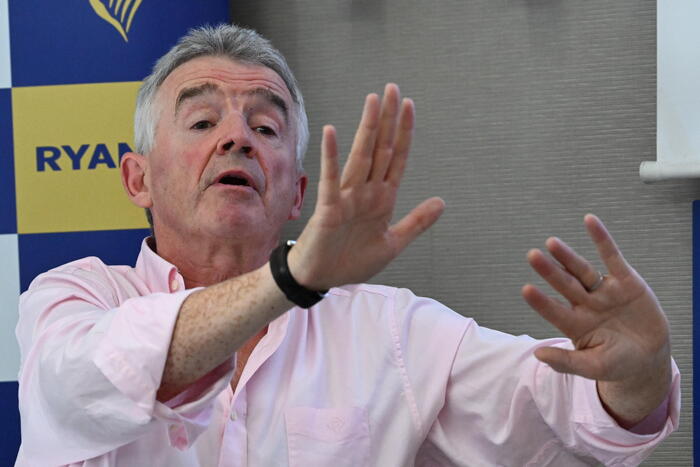The airline industry is experiencing the worst storm in its history.
In 2020, the Covid-19 pandemic reduced the number of passengers worldwide by 60%.
In total, airlines have lost 370 billion dollars (315 billion euros), around 40 have gone bankrupt and, at the start of 2021, more than a third of the 23,000 aircraft in the world are still nailed down. on the ground.
If all the companies suffer terribly, those designed on the low-cost model like Ryanair, Wizz Air or Vueling are doing less badly than the others.
"They are better equipped to manage periods of low activity, they have cash and lower fixed costs", decrypts Didier Bréchemier, partner of the Roland Berger firm and specialist in air transport.
The cash champion is Ryanair, sitting on a jackpot of 3.5 billion euros at the end of 2020. “We have a very healthy financial situation in a panorama of highly indebted companies, welcomes Julien Tranchant, the marketing and sales director in France of the firm à la lyre dorée.
We lost 900 million euros in 2020, it's very bad but it's much less than the others.
“In comparison, Air France lost 7 billion euros over the same period and, even saving money everywhere, the French company has increased its debt, which reaches 13 billion euros.
"Our pilots are not paid less, they are more productive"
"Low-cost models have ultra-efficient models because they were born like that, with, from the start, an optimized structure", assesses Xavier Tytelman, an expert in the aviation sector.
Whereas in a traditional airline the personnel represents the first item of expense, in a low-cost, it is fuel.
And its price melted as the epidemic and transportation restrictions tightened.
On the salary side, these companies can play on levers that their older competitors do not have.
"The ground staff are part of handling companies (
Editor's note: subcontractors
), they are only employed two hours before take-off", explains Xavier Tytelman.
Profitable.
And in a low-cost company, employees are sometimes self-employed or on fixed-term contracts for the season.
“This makes it possible in particular to fly more planes during peak summer periods,” underlines Didier Bréchemier.
Marc Rochet, president of French Bee, a low-cost French company specializing in Réunion and Tahiti, specifies: “Our pilots are not paid less, they are more productive.
Their schedules are optimized and they comply with European regulations.
"
Another winning feature of the model, the fact of favoring a single type of aircraft, for a single pilot training and standardized maintenance.
While EasyJet operates A319s and A320s, Transavia only uses Boeing 737s and Ryanair uses Boeing 737 max.
“Ryanair, capable of buying cash, negotiates its planes en masse at the best time, admires Xavier Tytelman.
It is said that the 737s purchased just after September 11, 2001 were sold at a higher price five years later.
“Taking advantage of the current disenchantment with the Boeing 737 max, the Irish company has also just reserved 75 additional units of the single aisle, bringing its total order to 210 aircraft.
More modern, less heavy, these planes will also lower the CO2 and fuel bill.
"People don't see a reason to pay more"
Proof that the model is successful, Air France has decided to accelerate the deployment of its subsidiary Transavia.
This summer, it will operate twenty domestic lines from Paris-Orly, but also between regional metropolises, such as Rennes-Montpellier, Brest-Toulon, Nantes-Toulon, or even Montpellier-Ajaccio.
Some were Air France lines.
"The idea is to operate them differently and to retain market share," indicates Nicolas Hénin, deputy general manager of sales.
The restructuring, which had already started, was accelerated by the crisis.
"
"On the medium-haul, there is no doubt, the world is
low-cost
because people see no reason to pay more," said Xavier Tytelman.
And gradually, the historic companies are playing the same score.
"They abandon all-inclusive tickets for point-to-point (
Editor's note: where the passenger pays for all the supplements: type of seat, checked baggage, drink, etc.
)", observes Didier Bréchemier.
Morning essentials newsletter
A tour of the news to start the day
Subscribe to the newsletterAll newsletters
READ ALSO>
Pandemic, ecology, end of business trips… will the plane recover?
Observers and industry players alike are convinced that low-cost airlines will also be the first to take off once health restrictions are lifted.
"What starts again immediately is the VFR traffic: visiting friends and relatives (
Editor's note: family and friendly trips
)", explains Nicolas Hénin of Transavia.
The company thus saw an explosion of its reservations for the summer last year after the first confinement or for Christmas.
Barely spoken the reassuring words of Boris Johnson, the Prime Minister of Great Britain, at the end of February, EasyJet and Ryanair recorded respectively + 300% and + 400% of bookings on British routes.
Crunch the big slice of the cake
Once the recovery comes, low-cost companies are also the most responsive.
"We have the ability to deploy planes quickly to the right place," says Bertrand Godinot, General Manager France and the Netherlands of EasyJet.
When we launched a corridor between the Canaries and the UK, bookings increased sixfold.
In the starting blocks, Frenchbee is too.
With an ambitious bet.
“I told my teams to be ready.
Less than two months after the lifting of US travel restrictions, our plane must land in New York!
»Announces its president, Marc Rochet.
According to him, the difficulties encountered by Norwegian or Level, two low-cost long-haul airlines, do not prove that the model only works on short or medium distances.
“To succeed, you have to be a real low-cost, points out Marc Rochet, who is also vice-president of Air Caraïbes.
Namely: to have been created from a blank sheet of paper, to use a unique fleet of aircraft and to have a digital marketing, aggressive on the price, on a very precise niche.
By applying these principles to Réunion and Tahiti, Frenchbee thus managed to be profitable only three years after its creation.
Helped by devalued planes, a less tense job market and flight slots, low-cost companies are already seeing their wings grow.
“In France, we are lagging behind in terms of low-cost penetration,” underlines the CEO of EasyJet.
In France and in Germany, the company represents less than 30% of the airline market.
"In the United Kingdom and Ireland, we operate a third of the country's flights and in Italy we are the number one company ahead of Alitalia," says Ryanair's commercial director.
In France, we are third behind Air France and EasyJet.
Our room for improvement is strong… ”






/cloudfront-eu-central-1.images.arcpublishing.com/prisa/FWGZ5IUZXVG3TDWBHUTF7BC35M.JPG)